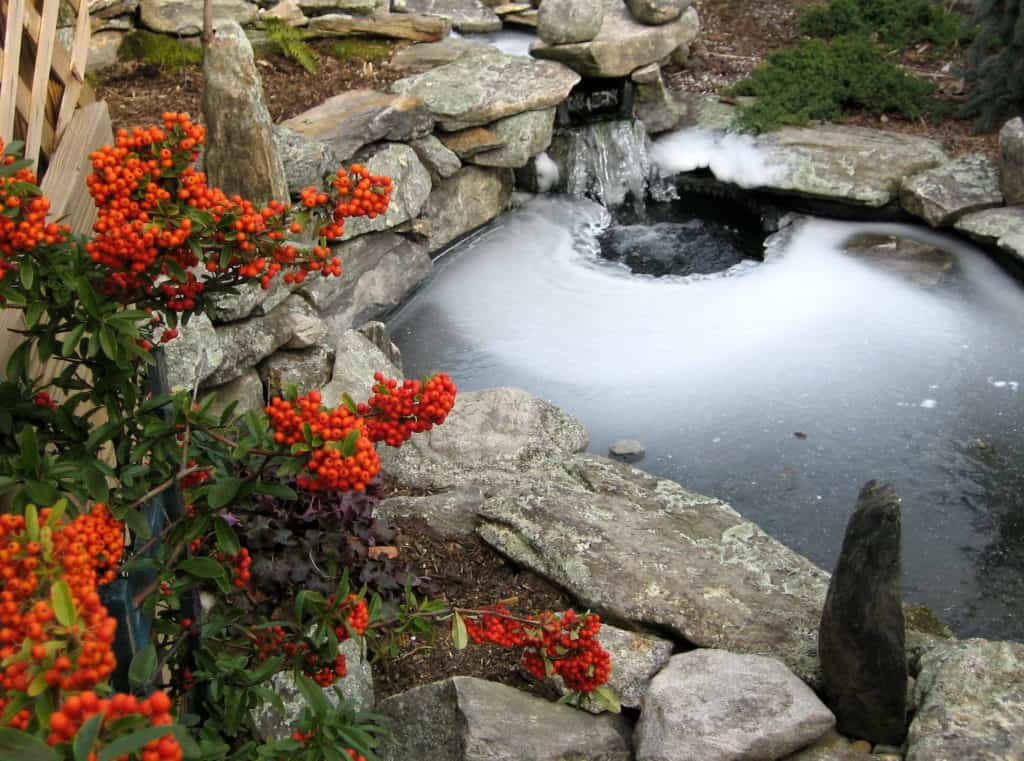**Post contains affiliate links.**
Thankfully, in our service area, there are very few regions that have temperatures cold enough to freeze outdoor fish ponds. Provided you have the correct species in your outdoor pond, caring for a fish pond in winter is a relatively easy process.
Remember, fish are ectotherms, with their metabolic processes relying on energy from the surrounding water. The warmer the water, the more active and hungry they will be with improved reproduction, immunity and growth. The opposite is true in colder water. As temperatures cool for the season, your fish will start to become more lethargic and slow their eating.
Although we have recommendations on what to feed and when, your pond will have it’s own cycle. If your pond will get down to freezing temperatures, it is critical to withhold food prior to make sure the food doesn’t remain in your fishes’ gut throughout the winter. Your fish will usually be smart enough to start fasting in low 50s and 40s, prior to the water freezing over.
The two key points about how to keep fish alive in winter is providing oxygen and a place where the water never freezes.
Providing Oxygen to Fish Pond in Winter
Thanks to simple physics, colder water holds onto more oxygen than warm water, so providing oxygen to fish at colder temperatures is a relatively easy process. A simple aerator or deicer to provide surface oxygen will suffice for many ponds. A backup, battery powered aerator is a good investment since you can run it if your power goes off due to storms. For all winter ponds, it is critical to provide a source of surface access for carbon dioxide to bubble off and oxygen to get into the water.
Waterfalls can be another good source of oxygen, but can actually super cool your system. The taller your waterfall, the more water comes into contact with super chilled air, which can cool off your pond VERY quickly. Many pond owners in freezing climates will drain and turn off their waterfalls during winter to prevent this and rely on other aerators. Be sure your system has a bypass to the waterfall so you do not shut down your filtration all together.
Preventing Total Ice in Fish Pond in Winter
Your pond must be deep enough and well insulated so it does not freeze into one, giant ice block. The key for fish to survive in a frozen pond is that it is not 100% frozen. If the surface freezes over, or even the first 12″, your pond should be deep enough and insulated on the sides to allow for enough room for your fish to swim. Again, remember that you need contact with the surface via an aerator or deicer to ensure your fish’s health.
If your pond is at risk of freezing solid, either evacuate the fish or provide insulation. Commercial insulation products are available for outdoor water features, or use old blankets.

Can I bring my fish inside in winter?
If you cannot abide by points 1 and 2 above, you will need to bring your fish inside for the winter. You are welcome to bring them inside regardless of your outside pond situation if you desire. Most fish will overwinter in a garage or basement, where water will still be cold, but not frozen. As with all fish systems, use a reliable thermometer to make sure your fish are acting appropriately for their temperature.
It is recommended to get your system set up inside a few days prior to moving your fish. The best time to move your fish is when your water outside matches your inside temperature. If you waited too long, you will need to slowly acclimate your fish to their new temperature so as to not stress them out.
Your indoor system can be setup very similarly to any hospital or quarantine system. Be sure to rescue your filtration as well! All of your carefully cultivated biomedia should be moved inside with your fish as well to prevent New Tank Syndrome.
